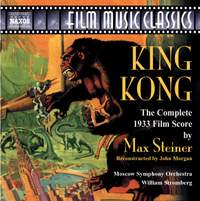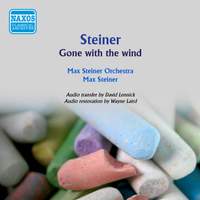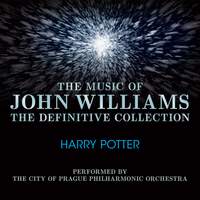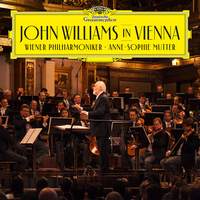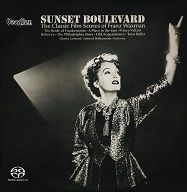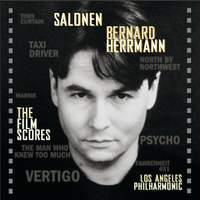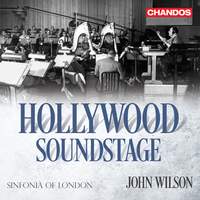Recollections,
The Unsung Composers of the Golden Age of Hollywood
In the fourth instalment of our Recollections series, Briana Hilton delves into the legacies of three giants of film music: Max Steiner, Franz Waxman and Bernard Herrmann.
From Steiner to Herrmann: The Pioneering Composers of Hollywood’s Golden Age
The Jazz Singer — the first feature-length film to incorporate synchronized sound for sequences of dialogue was released by Warner Bros. on October 6th, 1927. The sequences were brief, however, and the company released The Lights of New York the following year, serving as the first feature-length film with its entire dialogue recorded. 'From here, there was no going back: the era of silent films had come to an end and a revolutionized industry embraced sound', highlights the Museum of Modern Art. While hearing the voices of actors was a transformative experience on its own, however, music composers also played a key role in changing the industry — particularly during the Golden Age of Hollywood.
Max Steiner, ‘The Father of Film Music’
Max Steiner has been dubbed ‘The Father of Film Music,’ and for good reason. According to Yellowbrick, Steiner’s contribution to the film industry is 'immeasurable', citing him as a pioneer in the field: 'Steiner was the first composer to use a full symphony orchestra in a film score, and he was also the first to use a leitmotif, a recurring musical theme that is associated with a particular character or idea.' His work includes the scores for the 1933 film King Kong, Gone With the Wind (1939), and Casablanca (1942).

Richard Wagner is regarded as the earliest composer associated with the technique of leitmotif, though many have carried the concept throughout the history of film. In addition to Steiner, modern composer John Williams has made use of the leitmotif technique in both the Star Wars and Harry Potter franchises. While the use of the leitmotif in Star Wars can be more noticeable (as it is used to amplify combat scenes, romance, etc.), Williams's use of leitmotif in Harry Potter’s music is notable in ‘Hedwig’s Theme,’ which is interpolated through all eight instalments of the franchise.
The Harry Potter movies are a perfect example of how powerful music is, particularly when it comes to bringing the characters to life within the scenery. Notable filming locations throughout the UK include the Scottish Highlands, where Glenfinnan Viaduct in Lochaber serves as a key setting for Hogwarts Express journeys, as well as the nature reserves at Glencoe, Argyll, which serve as the home to Hagrid’s Hut. With picturesque settings such as these, the accompanying music works to evoke powerful emotions all while adding to the magical world that unfolds on the big screen.
Franz Waxman’s silent legacy
Franz Waxman composed the scores for hundreds of films. Among them include the scores for the 1935 film Bride of Frankenstein, Alfred Hitchcock’s Rebecca (1940), and 1950’s Sunset Boulevard. A 2008 PBS article by Elyse Eisenberg delves into Waxman’s legacy and the thoughts of his son, John Waxman, who notes that while people may recognize the music from the films that his father worked on, most don’t even know his father’s name. 'Among film historians and people who are serious about film, Franz Waxman is one of the best-known film composers. Maybe what John Waxman is saying is that he is not as famous as he should have been' Jeanine Basinger, a film professor at Wesleyan University remarked.
Basinger goes on to highlight the fact that Hollywood films from Waxman’s time in the industry simply didn't credit cinematographers or composers — even directors were often ‘invisible,’ due to the focus being on the stars of the film themselves. However, 'All of that began to change in the 1960s when movies evolved into an art form, and people began looking at the art behind the scenes', states the PBS article.

Bernard Herrmann, evoking suspense through Psycho’s score
Widely known as one of the best film composers, American composer and conductor Bernard Herrmann’s work ranges from the 1953 Western Beneath the 12-Mile Reef to the 1951 science fiction film The Day the Earth Stood Still, Herrmann is well regarded for his later work as well, which include the music for 1976’s Taxi Driver as well as Obsession of the same year. However, Herrmann’s music is likely most recognizable from his work on Alfred Hitchcock’s films.
Herrmann wrote the scores for seven of Hitchcock’s films, including The Trouble with Harry (1955), Vertigo (1958), and The Man Who Knew Too Much (1956). 1960’s Psycho, however, is undoubtedly one of his most famous. An NPR article from 2000 written by Robert Siegel details the score of the 1960 horror film, noting that the opening credits of the movie left audiences to hear 'something unnerving: a string ensemble striking a chilling chord composed by Bernard Herrmann'.
In an interview with NPR, Herrmann’s biographer Steven Smith noted that he thinks that one of Herrmann’s proudest moments of his career as a film composer involved the famous Psycho shower scene. Initially, Hitchcock had planned for the scene to have no music. 'And Benny later said that he told Hitchcock, "Well, I did compose something. Would you like to hear it?". And he played it for Hitchcock, and Hitch said, "Well, absolutely, we’ll use that". And Benny, rubbing it in, said "But you said no music", to which Hitchcock replied "Improper suggestion, my boy. Improper suggestion."' Today, the shrieks of violins that can be heard during the film’s shower scene have cemented it as a staple of the horror genre, even over sixty years later.

Hollywood’s Golden Age was a time for innovation, with the introduction of sound bringing a transformative experience to audiences. In addition to dialogue, however, music composers have undoubtedly changed the game — including the work of composers like Steiner, Waxman, and Herrmann.
Briana spent a decade working around studios in various capacities before taking a step back to start a family. She has since rediscovered her teenage passion for writing and enjoys contributing to a range of publications, both print and online.
Moscow Symphony Orchestra, William Stromberg
Available Formats: CD, MP3, FLAC
Max Steiner Orchestra, Max Steiner
Available Formats: MP3, FLAC
The City of Prague Philharmonic Orchestra, Nic Raine, James Fitzpatrick
Available Formats: MP3, FLAC
Anne-Sophie Mutter (violin), Wiener Philharmoniker, John Williams
Available Formats: MP3, FLAC, Hi-Res FLAC
National Philharmonic Orchestra, Charles Gerhardt
Available Format: SACD
Los Angeles Philharmonic Orchestra, Esa-Pekka Salonen
Available Formats: MP3, FLAC
Sinfonia of London, John Wilson
Available Formats: SACD, MP3, FLAC, Hi-Res FLAC


